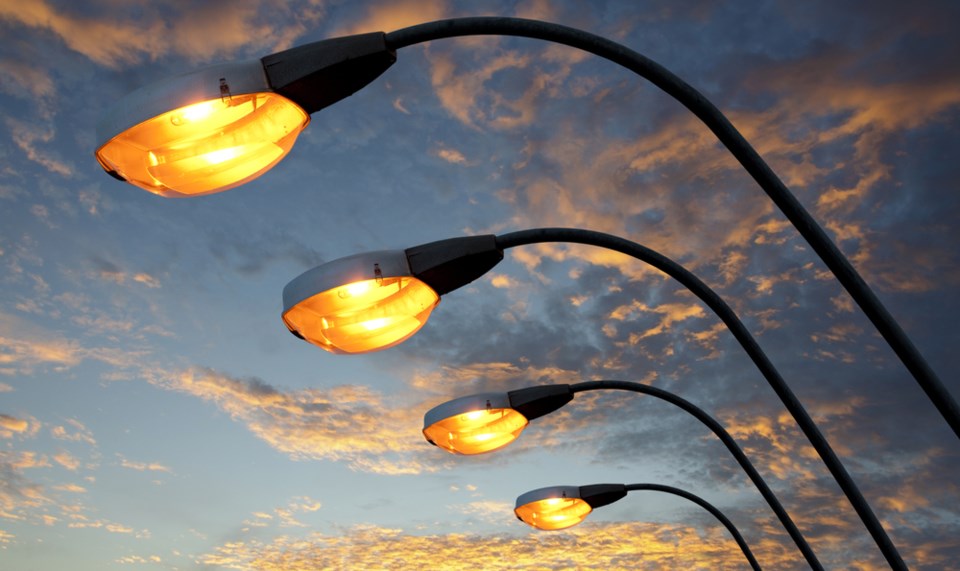The global pandemic has led to some dark days but it won’t stop a bright idea from taking root on Orillia’s streets.
The city’s $2.4-million decision to upgrade its street lights to LED technology is moving forward.
And while the pandemic might mean it takes a little longer, staff report the project is on track to be on budget and annual operating costs will be much less than expected.
Council gave the go-ahead for the project during its 2020 capital budget deliberations. The bulk of the money - $1,950,000 - was to be used to upgrade to LED streetlighting while the remaining $450,000 was to be spent on ‘smart lighting controls’ that would allow the city to maximize its investment.
In a memo to city councillors, staff reported that those numbers have changed.
The cost of the smart controls has escalated, but thanks to a higher-than expected rebate for moving to more environmentally-responsible lighting, the cost of the streetlights will be lower than anticipated.
The new numbers follow a detailed analysis of the city’s 3,200 streetlights between January and May conducted by RealTerm Energy.
During capital budget discussions, it was estimated the city would be eligible for rebates through the Independent Electricity System Operator (IESO) Save on Energy campaign ranging between $100,000 to $300,000.
RealTerm, through its analysis, has determined the city’s ‘eligible incentive’ will be almost $305,000 “contingent on utility and IESO final approval at the conclusion of the project.”
That helps bring down the capital costs for the new LED lights. It also means a $392,000 contingency built into the price tag will not be required.
However, it’s not all good news.
It was estimated the city would need to spend about $450,000 for what’s known as Smart Lighting Controls. Moving to a smart (computerized) system would allow lighting levels to be adjusted remotely among other energy-saving benefits.
That estimate was provided by RealTerm and was based on similar municipal lighting control procurements completed at the time of the budget report preparation.
RealTerm conducted a formal request for proposals evaluation process to solicit responses from the major manufacturers of Smart Controls active in North America.
“Based upon RealTerm’s experience with many smart lighting control manufacturers and the minimum requirements that a smart control system requires to operate, bidding documents were prepared after receiving input from the city’s EIS, IT division and treasury staff as well as Orillia Power Distribution (OPDC).”
All submissions exceeded the originally allocated $450,000. In the end, the winning bid was almost $650,000 - or $200,000 more than expected.
“Based on feedback from RealTerm and the industry this was largely attributed to a significant increase in transportation costs for component parts required to build the controls, manufactured overseas, and a weakened Canadian dollar,” noted the report.
“Disruptions to the supply chain have also occurred, elevating component pricing.”
The recommended Smart Lighting Controls product satisfied all evaluation criteria, and demonstrated great value for the city and scored especially high in how user-friendly their software is, company strength, training/support and IT security.
Additionally, the estimated $30,000-$40,000/year software and product support costs identified on the original capital budget submission are substantially reduced based on the recommended smart lighting controls product. It's estimated now the annual cost will be about $10,000.
All in all, it means the project will come in on budget, staff reported.
“Despite a number of factors and circumstances changing since the time of the original proposal and budget submission last year, the approved capital budget is able to accommodate the completion of the LED streetlight upgrade with the selected preferred Smart Lighting Controls product,” concludes the memo to councillors.
The pandemic has resulted in longer product lead times than anticipated. As a result the city will work next to finalize the contract for the project to enable orders to be placed as timely as possible for lighting and controls.
The installation phase of the project is scheduled to commence late this summer or early this fall.
